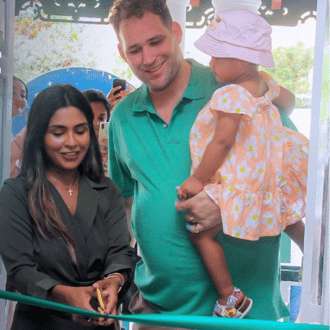Malini was sitting anxiously in the crowded clinic waiting room . She could hear the sound of cars whizzing by outside, on the busy Elivitigala Mawatha. People on their way to work, school , just getting on with their daily lives. But for Malini , her mind was crowded with fears of what to expect. The nurse gave her a warm reassuring smile and chatted with her which helped to take her mind of her worry. After months of experiencing discomfort in one breast, she finally took the step of going to the cancer early detection clinic in Narahenpita , which she passed daily on her way to work and back.
It had started of with a little lump, with slowly got bigger and more painful. Over the next few months Malini kept pushing aside the hidden fear. “It can’t be anything serious” was her attitude. Only after several months did Malini decide to do something about it.
One year later, after that initial screening which revealed early stage breast cancer Malini underwent treatment and is now completely cured and leads a normal healthy life.
Breast cancer is a type of cancer that starts in the breast. Cancer starts when cells begin to grow out of control. Breast cancer cells usually form a tumor that can often be seen on an x-ray or felt as a lump. Breast cancer occurs almost entirely in women, but men can get breast cancer, too.
Breast cancer is the most common cancer affecting women worldwide. Over the last several decades, the incidence of breast cancer has risen globally and this is estimated to increase by another 25% by year 2020. Studies have shown that the greatest increase will be among women in developing countries, a majority of who, live in the Asian region. According to data from the International Agency for Research on Cancer (IARC), a disproportionately high number of breast cancer deaths occur in developing countries due to lower cancer specific survival rates.
In Sri Lanka there has been a gradual and a uniform increase in the incidence of breast cancer. Today breast cancer is the leading cause of death in women in the age group 40-55 years, and the highest cancer in females. While this can be partially attributed to improvement of the coverage of the national cancer data, and an increase in diagnosis due to breast cancer screening, as with other countries in the region the increased incidence is also due to the consumption of processed and fatty food, sedentary lifestyle leading to increased obesity, delay in childbearing and reduced rates and duration of breast feeding.
Sri Lanka has a free public healthcare system, although private health systems which run parallel, make a substantial contribution. The burden of cancer care rests almost exclusively with the public sector due to high cost of cancer care which is beyond the affordability of most average Sri Lankans. Access to early detection is key, as it determines how rigorous ones treatment has to be, and could the deciding factor between life and death. Early detection is therefore critical.
This is where the Rotary Club of Colombo’s National Cancer Prevention & Early Detection Centre, situated at No: 516 1/1 , Elvitigala Mw, steps in. Established fifteen years ago by the Rotary Club of Colombo, it is operated by the National Cancer Control Programme of the Ministry of Health and is presently the only national facility dedicated for screening, early detection and prevention of cancer, offering services entirely free of charge. The Centre operates a comprehensive cancer screening facility complete with Mammography Machine and Ultra Sound Scanner with a radiographer available at the Centre to operate the facility. In addition cervical cancer screening is carried out with a HPV/DNA testing facility and colposcopy machine, whilst oral cancer, the highest cancer amongst males, is screened through a fully equipped dental unit.
To date, approximately 74,000 individuals, mainly females, have been screened at the Centre, and around 18,500 cases identified needing further investigation. Malini was one such case. She chose to go to the Center and make use of the facilities provided – facilities which saved her life.
As the incidence of cancer rises, the need for an increased availability and affordability for early detection becomes apparent. Public-Private Partnerships such as the National Cancer Prevention & Early Detection Centre have made a valuable contribution towards this critical need.
October is marked as Breast Cancer Awareness Month – get yourself checked at The National Cancer Prevention & Early Detection Centre located at No: 516 1/1 , Elvitigala Mw, open Monday to Friday from 9:00am-4:00pm.






